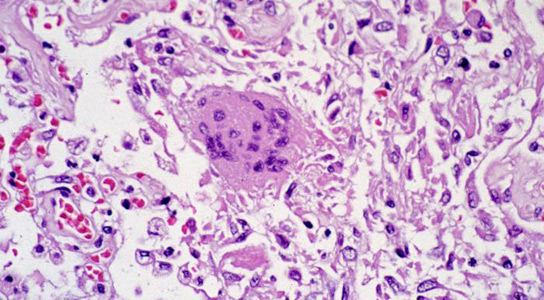
Lung tissue containing the original SARS coronavirus. Credit: CDC, 2003
Back in February 2003, a 65-year-old physician living near Hong Kong checked into a hotel. Sometime during his stay, he encountered a dozen other people; most of them were hotel guests on the same floor. The physician contracted a disease that left him with flu-like symptoms for a week before it started to develop into pneumonia. The next day he checked himself into a hospital and died later that day.
In the following days, the people who crossed the physician’s path left the hotel and went home to Vietnam, Singapore, Canada and Ireland. They spread SARS all over the world. Within a month, health authorities in 14 countries had identified more than 1,300 cases of SARS. Within 5 months, SARS had caused 8,098 illnesses, and 774 deaths in 26 countries.

SARS had been brewing for months in China, and managed to escape. It was caused by a coronavirus, for which treatment is complicated and there was no vaccine. Health authorities have identified another novel coronavirus, which is so new that it hasn’t been named yet.
The virus has caused a few illnesses and a few deaths in the past weeks. It caused the illness of one man who visited Saudi Arabia, but who’s currently hospitalized in England. Another Saudi was killed by an almost identical virus. There’s a report of another Saudi dying, which has sparked concerns about a possible outbreak in Jordan. Five people have been put into an isolation ward in Denmark with similar symptoms.
The virus causes rapid renal failure, and while it has only been primarily discovered in Saudi Arabia, millions of people will be converging on Mecca, Islam’s holy city for the Hajj. This could likely spread the disease very rapidly all over the world.









Be the first to comment on "New Coronavirus Could Infect Millions During Hajj in Saudi Arabia"